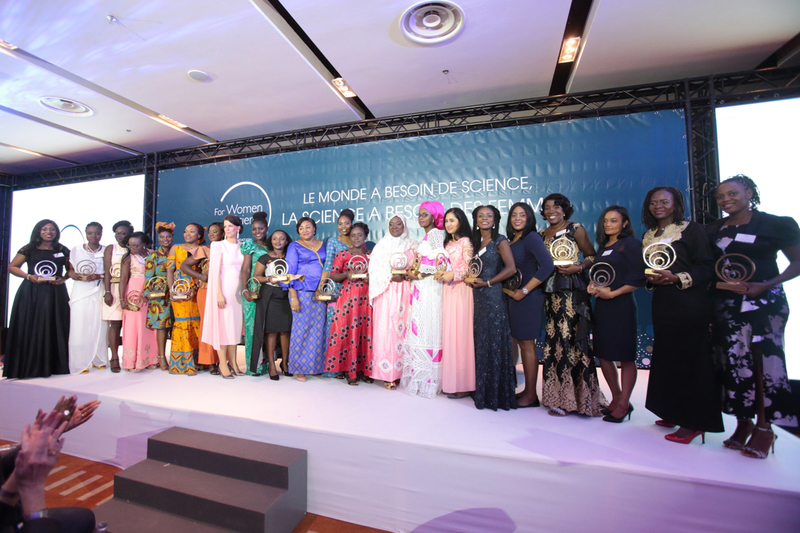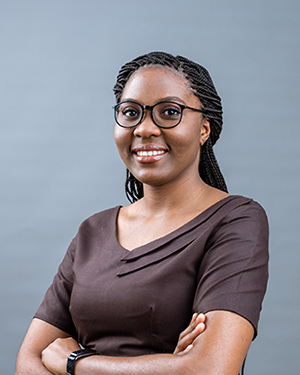UCT shines at L’Oréal-UNESCO sub-Saharan Africa
06 December 2019 | Story Nadia Krige. Photos supplied. Read time 9 min.
Two researchers from the University of Cape Town (UCT) are among 20 women scientists recognised by the L’Oréal-UNESCO For Women in Science programme for their excellent contributions to science in sub-Saharan Africa.
Regina Esinam Abotsi, a PhD candidate in the Department of Molecular and Cell Biology, and the Institute of Infectious Disease and Molecular Medicine, and Mweete Nglazi, a PhD candidate in the Division of Health Economics within the School of Public Health and Family Medicine, were each awarded a grant of EUR10 000 (about ZAR162 350) to further their research.
“These computer scientists, engineers and biologists are proof of the diversity of women’s scientific excellence in sub-Saharan Africa.”
Abotsi and Nglazi were among 20 women scientists (15 PhD candidates and five post-doctoral researchers) from 15 countries chosen for the 10th edition of the L’Oréal-UNESCO For Women in Science Sub-Saharan Africa Young Talents Awards.
They were chosen from among more than 400 candidates by a jury of experts.
“These computer scientists, engineers and biologists are proof of the diversity of women’s scientific excellence in sub-Saharan Africa,” says Alexandra Palt, executive vice-president of the L’Oréal Foundation. “They are devoted to solving issues that are particularly pressing on the continent, including improving nutritional well-being, the fight against neonatal mortality, tuberculosis and malaria.”
The 20 winning researchers, along with their seven colleagues from the inaugural L’Oréal-UNESCO For Women in Science South African National Programme, participated in four days of training in Dakar, Senegal, followed by the prestigious awards ceremony to celebrate their achievements and receive their grants. International experts selected by the L’Oréal Foundation covered different dimensions of the training: leadership, management, negotiation, public speaking, media training and personal branding.
Palt expressed her hope that this would help to “ensure they are better equipped to pursue their career and break the glass ceiling more easily.”
- Regina Esinam Abotsi, Department of Molecular and Cell Biology
Determining antibiotic resistance in potentially pathogenic bacteria present in the respiratory tract of HIV-infected children

Growing up in the Ghanaian town of Anloga (in the Volta Region) – the youngest child and only girl in a family of six – Esinam knew from an early age that she wanted to be a scientist.
“As a child, I would always read the label and chemical composition of every drug I came across,” she recalls. “I was also intrigued by herbal preparations that seemed to have similar magical effects.”
Her father, who had already encouraged his sons to pursue scientific careers, was even more keen to encourage his daughter’s interest in science.
As a result of her long-held interest in drugs and the components that work together to create them, she decided to pursue an undergraduate degree in Pharmacy. She decided to move to Cape Town to continue her postgraduate studies at UCT due to the limited funding opportunities in Ghana.
Through her PhD, she seeks to investigate antibiotic resistance in HIV-infected children with chronic lung disease (CLD). Some of her team’s recent research in sub-Saharan Africa has shown that a novel type of chronic lung disease, known as obliterative bronchiolitis, is present in 30% of all HIV-infected children. Chronic lung disease is responsible for about 50% of all death and illness in HIV-infected children.
One of the aims of her research is to establish whether administering an antibiotic called azithromycin promotes resistant pathogens in the same way many other antibiotics do. The findings from her research will influence the recommendation of azithromycin as treatment for CLD in HIV-infected children.
“My ultimate goal as a researcher is to contribute to solving the global problem of antibiotic resistance, and my current research helps to achieve this goal.”
- Mweete Nglazi, Division of Health Economics within the School of Public Health and Family Medicine
An analysis of overweight and obesity in South Africa: the case of women of childbearing age

“I want to do work that will improve the lives of women in South Africa and by extension, sub-Saharan Africa,” says Nglazi, whose research will look at the trends, determinants and socio-economic inequality of overweight and obesity in women in South Africa. She is completing her PhD under the supervision of Associate Professor and Director of the Health Economics Division John Ataguba.
While obesity is a topic that has been widely studied, Nglazi argues that very few researchers have focused on women of a childbearing age, between 15 and 49 years old.
“These women are at risk of a very particular set of obesity-related maternal and child health problems such as infertility, miscarriage, babies having congenital abnormalities and other adverse obstetric outcomes,” she explains.
Nglazi is set to complete her dissertation in 2020 and foresees a bright future of commitment to furthering her research and academic interests.
“Being a teaching assistant, I really enjoy the contact with the students, especially young women. My wish is to be a professor and to work in a United Nations agency,” she says. “I wish to do work that informs policy and contributes to people’s wellbeing in South Africa, in my own country, Zambia, and across the world.”
A historical commitment
Created in 1998, the For Women in Science programme, led by the L’Oréal Foundation in partnership with UNESCO, aims to promote women in the field of scientific research. Over the past 21 years, more than 3 400 women researchers from 118 countries have been highlighted.
“The number of women in science is not yet significant: only 2.4% of the world’s researchers are African scientists of whom 30% are women,” says Palt. “Through the Young Talents Awards for Sub-Saharan Africa, we promote and support the continent’s remarkable female researchers.
“They play a key role to develop inclusive research in Africa, for Africa and conducted by Africans.”
 This work is licensed under a Creative Commons Attribution-NoDerivatives 4.0 International License.
This work is licensed under a Creative Commons Attribution-NoDerivatives 4.0 International License.
Please view the republishing articles page for more information.
Research & innovation





































